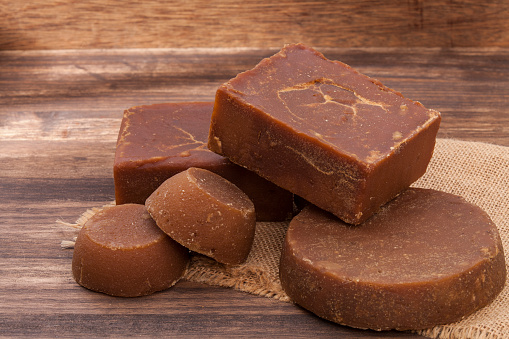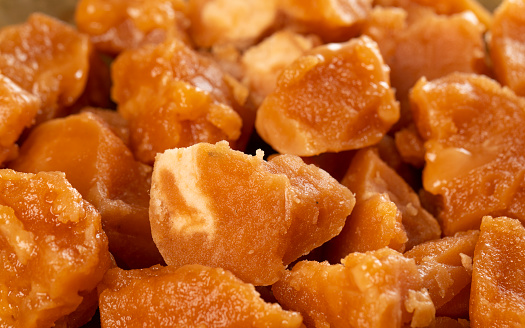Jaggery, also known as unrefined sugar or Gur, is a traditional sweetener commonly used in India and other South Asia. It is made from the sap of the coconut palm, date palm, or sugarcane plant and is known for its rich, caramel-like flavor. But beyond its taste, what is the nutritional value of jaggery per 100g, and is it healthy for you?
First, let’s take a look at the nutritional value of jaggery per 100g. According to the United States Department of Agriculture (USDA), 100g of jaggery contains approximately:
380 calories
98g of carbohydrates
0g of protein
0g of fat
It is worth noting that jaggery contains a relatively high amount of calories and carbohydrates compared to other sweeteners. However, it is also important to keep in mind that the serving size for jaggery is typically much smaller than that of refined sugars, as it is generally used in smaller amounts due to its strong flavor.
Jaggery also contains a range of vitamins and minerals, including:
Iron: Jaggery is a good source of iron, with 100g providing approximately 28% of the recommended daily value (DV). Iron is an essential mineral that plays a vital role in the production of red blood cells and the transportation of oxygen throughout the body.
Magnesium: Jaggery is also a good source of magnesium, with 100g providing approximately 16% of the DV. Magnesium is an essential mineral that is involved in over 300 enzymatic reactions in the body and is necessary for the proper functioning of muscles, nerves, and bones.
Potassium: Jaggery contains a moderate amount of potassium, with 100g providing approximately 8% of the DV. Potassium is an important mineral that helps regulate blood pressure and maintain proper heart function.
B-vitamins: Jaggery contains small amounts of several B-vitamins, including thiamin, riboflavin, and niacin. B-vitamins are important for energy metabolism and the proper functioning of the nervous system.
Now that we’ve looked at the nutritional value of jaggery per 100g, let’s consider whether it is healthy for you.
One of the main benefits of jaggery is that it is a natural sweetener that is minimally processed, making it a healthier alternative to refined sugars. Refined sugars, such as white sugar and corn syrup, are stripped of their natural nutrients during the refining process, leaving them with little to no nutritional value. In contrast, jaggery retains a number of nutrients and minerals, making it a more nutrient-dense sweetener.
Jaggery has also been shown to have some potential health benefits. For example, some research suggests that jaggery may help improve digestion and boost the immune system. It has also been suggested that jaggery may have antioxidant properties and may help reduce inflammation in the body.
However, it’s important to keep in mind that jaggery is still a source of added sugars and should be consumed in moderation as part of a balanced diet. Like all sweeteners, jaggery should be consumed in moderation as part of a healthy diet that includes a variety of whole foods.
In conclusion, jaggery is a natural sweetener that is minimally processed and contains a range of vitamins and minerals. While it may have some potential health benefits, it is still a source of added sugars and should be consumed in moderation as part of a balanced diet.

 Home
Home Health
Health Diet & Nutrition
Diet & Nutrition Living Well
Living Well More
More












